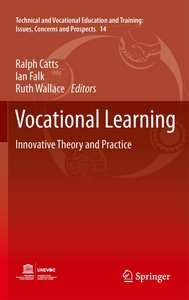Constructing learners as members of networks
Balatti, Josephine, and Black, Stephen (2011) Constructing learners as members of networks. In: Catts, Ralph, Falk, Ian, and Wallace, Ruth, (eds.) Vocational Learning: innovative theory and practice. Technical and Vocational Education and Training: issues, concerns and prospects, 14 . Springer, Dordrecht, The Netherlands, pp. 63-76.
![[img]](https://researchonline.jcu.edu.au/21208/2.hassmallThumbnailVersion/21208_Balatti_et_al_2011_Book_cover.jpg)
|
Image (JPEG) (Book Cover)
- Cover Image
Download (72kB) |
|
|
PDF (Published Version)
- Published Version
Restricted to Repository staff only |
Abstract
Networks are the sites through which social capital is generated. The number and the nature of memberships that people have in networks are indicators of the social capital that they can access. This chapter considers the possible consequences for pedagogy and even for what is valued as training outcomes if learners, in particular TVET learners, are seen as members of networks. The chapter begins with a discussion of what it means to conceptualize learners as members of networks. It then draws on research studies undertaken by the authors to identify the pedagogical strategies that seem to enhance the potential for social capital outcomes to occur for learners. It concludes with the kinds of social capital outcomes that learners can experience. Findings drawn on in this chapter are primarily from researching adult language, literacy and numeracy training.
How educators view their adult learners affects how they teach and what they value as learning outcomes. Teachers can hold multiple, and sometimes even contradictory, conceptualizations of who their learners are in their courses and in the other contexts of their lives. Conceptualizations are many and range from the concrete to the metaphorical. Learners may be viewed as tradespeople or professionals 'in the making'; as problem solvers; as team members; as lifelong learners; as agents for change; as contributors to society; or as replacements for those who depart. The learning theories to which educators subscribe also lead to different conceptualizations of the learner - as an 'empty vessel', as a builder of knowledge, or as a co-constructor of knowledge in community with others. Deficit labels to do with ethnicity, gender and class can have educators refer to cohorts of learners as the 'socially excluded', the 'marginalized', and the 'disadvantaged'. In this chapter, we invite you to think about learners as members of networks or as having accesS to particular networks. Networks are the links among people which are activated for particular purposes. Networks exist in social units such as families, friendship groups, community groups, special interest groups, or in any collection of people that have some fonnal or infonnal association. To construct learners as members of networks focuses attention on the connections that learners mayor may not have with others and on what those connections might mean for their learning experience. To think of learners as members of networks or as having access to networks has implications for the pedagogical choices teachers make, and even for what they consider to be worthwhile outcomes for those who undertake the education and training they deliver.
| Item ID: | 21208 |
|---|---|
| Item Type: | Book Chapter (Research - B1) |
| ISBN: | 978-94-007-1538-7 |
| Keywords: | vocational learning, constructing learners, networks, education, pedagogy, training outcomes, TVET learners |
| Date Deposited: | 19 Apr 2012 06:59 |
| FoR Codes: | 13 EDUCATION > 1302 Curriculum and Pedagogy > 130213 Vocational Education and Training Curriculum and Pedagogy @ 60% 13 EDUCATION > 1301 Education Systems > 130101 Continuing and Community Education @ 40% |
| SEO Codes: | 93 EDUCATION AND TRAINING > 9301 Learner and Learning > 930103 Learner Development @ 100% |
| Downloads: |
Total: 1369 Last 12 Months: 6 |
| More Statistics |




